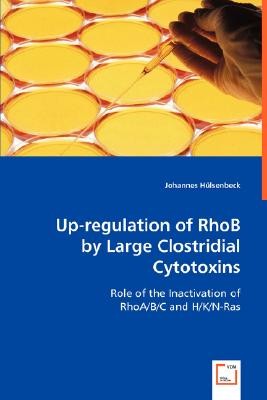
- We will send in 10–14 business days.
- Author: Johannes Hülsenbeck
- Publisher: VDM Verlag Dr. Mueller E.K.
- Year: 2008
- Pages: 68
- ISBN-10: 3639001680
- ISBN-13: 9783639001686
- Format: 15.2 x 22.9 x 0.4 cm, minkšti viršeliai
- Language: English
- SAVE -10% with code: EXTRA
Up-regulation of RhoB by Large Clostridial Cytotoxins (e-book) (used book) | bookbook.eu
Reviews
Description
Clostridium difficile toxins A (TcdA) and B (TcdB) are monoglucosyl-transferases that inactivate RhoA, Rac1, and Cdc42. By these means, the toxins cause actin reorganisation (cytopathic effect) and apoptosis (cytotoxic effect). The cytotoxic effect has generally been attributed to the inactivation of RhoA. Treatment of cultured cells with Clostridium difficile toxin A (TcdA) also causes RhoB up-regulation. This study focuses on the up-regulation of RhoB and its functional consequences in toxin-treated cells. RhoB is up-regulated after treatment of fibroblasts with RhoA/B/C (TcdB, C. limosum C3) or H/K/N-Ras (C. sordellii lethal toxin) inactivating toxins. The up-regulation is based on transcriptional activation. p38 MAP kinase is identified as enhancer of RhoB up-regulation. Finally, RhoB is found to regulate TcdB-induced apoptosis.
EXTRA 10 % discount with code: EXTRA
The promotion ends in 22d.16:12:21
The discount code is valid when purchasing from 10 €. Discounts do not stack.
- Author: Johannes Hülsenbeck
- Publisher: VDM Verlag Dr. Mueller E.K.
- Year: 2008
- Pages: 68
- ISBN-10: 3639001680
- ISBN-13: 9783639001686
- Format: 15.2 x 22.9 x 0.4 cm, minkšti viršeliai
- Language: English English
Clostridium difficile toxins A (TcdA) and B (TcdB) are monoglucosyl-transferases that inactivate RhoA, Rac1, and Cdc42. By these means, the toxins cause actin reorganisation (cytopathic effect) and apoptosis (cytotoxic effect). The cytotoxic effect has generally been attributed to the inactivation of RhoA. Treatment of cultured cells with Clostridium difficile toxin A (TcdA) also causes RhoB up-regulation. This study focuses on the up-regulation of RhoB and its functional consequences in toxin-treated cells. RhoB is up-regulated after treatment of fibroblasts with RhoA/B/C (TcdB, C. limosum C3) or H/K/N-Ras (C. sordellii lethal toxin) inactivating toxins. The up-regulation is based on transcriptional activation. p38 MAP kinase is identified as enhancer of RhoB up-regulation. Finally, RhoB is found to regulate TcdB-induced apoptosis.


Reviews